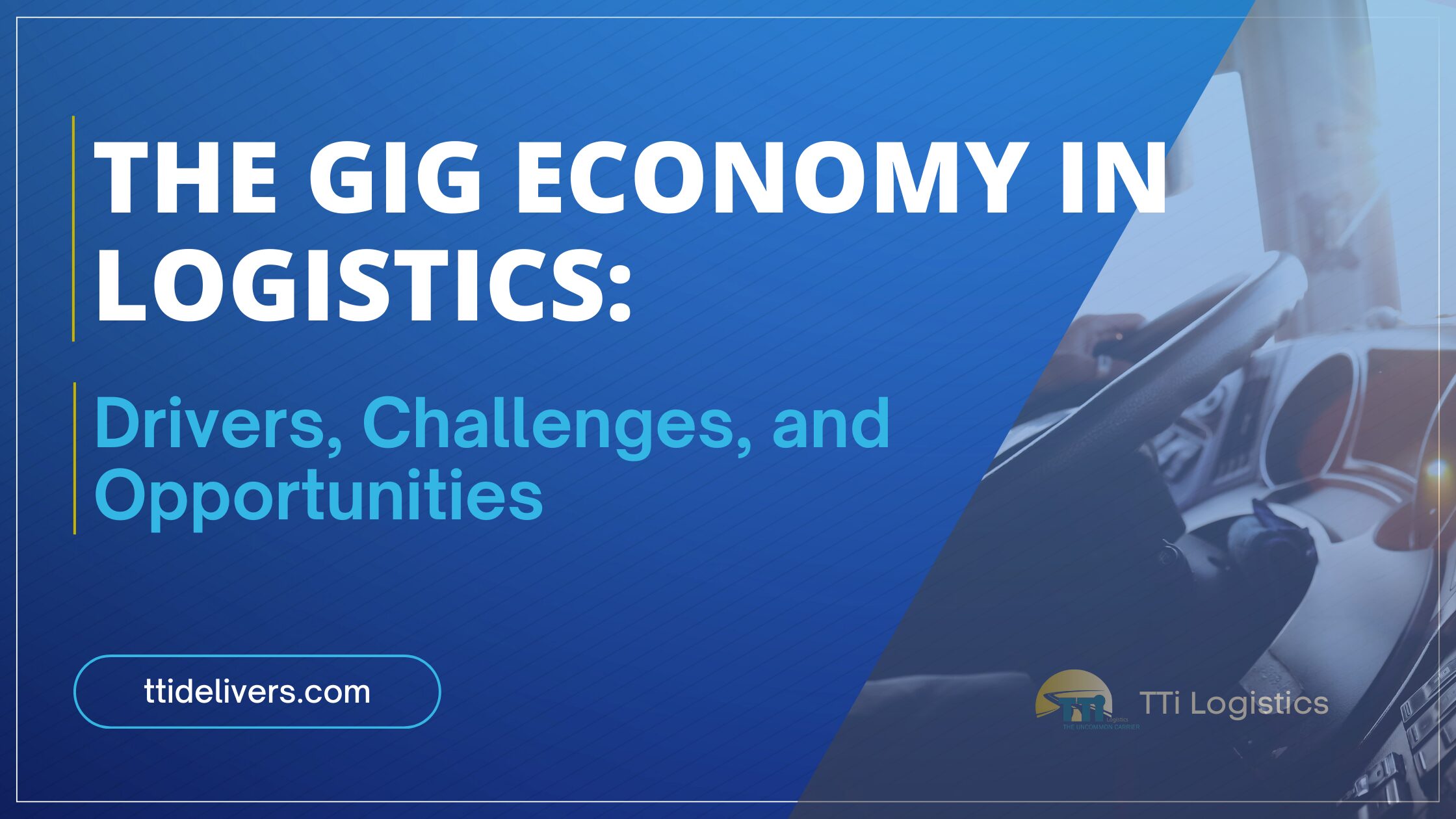How On-Demand Work is Reshaping the Logistics Industry
The way people work is changing—and so is the way goods move. Over the past decade, the gig economy has grown rapidly across industries, from food delivery to freelance services. Now, it’s making a major impact in logistics. As businesses seek more flexible, scalable shipping models, the gig economy in logistics has become both a solution and a new challenge.
Instead of relying entirely on traditional employees or long-term carrier partnerships, companies are increasingly turning to independent contractors, on-demand drivers, and third-party service apps to handle everything from last-mile delivery to freight hauling.
This shift offers new efficiencies and cost savings—but it also introduces new complexities in workforce management, quality control, and compliance.
Understanding the Gig Economy in Logistics
The gig economy refers to a labor market characterized by short-term contracts or freelance work as opposed to permanent jobs. In logistics, this includes independent drivers, owner-operators, and third-party contractors who handle tasks like last-mile delivery and freight hauling. These workers are typically paid per job or delivery, offering flexibility for both the worker and the company. As this labor model expands, logistics providers are increasingly evaluating how to leverage this flexible workforce while still maintaining service standards and accountability.
Examples of Gig Models in Logistics
Several models illustrate how the gig economy operates within logistics:
- Rideshare-style parcel delivery: Platforms like Roadie and Amazon Flex allow individuals with a car and smartphone to deliver packages.
- Crowdsourced trucking: Startups connect businesses with available owner-operators in real time.
- On-demand warehouse staffing: Temporary labor platforms fill short-term roles during peak seasons or special projects.
Drivers of the Shift Toward Gig-Based Logistics
Several factors contribute to the rise of gig-based logistics:
- E-Commerce Growth and Delivery Pressure: The surge in online shopping has increased demand for small-package deliveries. Gig drivers offer fast, local fulfillment, especially in urban areas where flexibility is crucial.
- Labor Shortages in the Transportation Industry: A shortage of truck drivers and warehouse staff has led companies to tap into underutilized labor pools, reducing dependence on full-time hires.
- Cost Pressures and Rising Overhead: Businesses aim to control costs and reduce fixed overhead. Gig workers, who typically do not receive benefits or long-term contracts, are more cost-effective for short-term needs.
- Mobile Technology and Platform Growth: The proliferation of delivery apps and mobile work platforms makes it easier for workers to find and accept jobs, and for companies to manage distributed fleets in real time.
- Need for Flexibility During Peak Seasons: Retailers and shippers require extra hands during holidays or sales events. Gig workers allow for rapid scaling of operations without hiring permanent staff.
Benefits of the Gig Economy for Logistics Companies
When managed well, gig-based logistics models offer several advantages:
- Scalability and Speed: Gig workers can often be onboarded and deployed within hours, providing instant coverage and flexibility.
- Lower Overhead Costs: Without the long-term financial commitments of full-time employment, companies can reduce labor costs and improve margins.
- Expanded Delivery Windows: Many gig workers are willing to work early mornings, evenings, or weekends, allowing logistics providers to offer broader service hours.
- Access to Local Knowledge: Local gig drivers often know shortcuts, traffic patterns, and delivery quirks better than out-of-town drivers or routing software.
- Quick Problem Solving: During emergencies or staffing shortages, gig workers can fill in gaps and keep shipments moving with minimal disruption.
Challenges of Gig-Based Logistics Models
Despite the benefits, gig-based logistics models present several challenges:
- Quality Control and Service Consistency: Service quality can vary due to the independent nature and varying experience levels of gig workers. Issues may include missed or delayed deliveries and inadequate customer service.
- Limited Accountability: Enforcing performance metrics or standards can be difficult with gig workers. Rating systems may not always align with a company’s brand expectations.
- Safety and Liability Risks: Without clear legal agreements, incidents involving gig drivers can expose businesses to liability.
- Compliance and Classification Issues: Misclassifying employees as independent contractors can lead to fines and lawsuits, especially as regulations tighten.
- High Turnover and Training Gaps: Frequent movement between platforms by gig workers necessitates ongoing onboarding and support, without the benefit of long-term retention.
TTi Logistics’ Approach to Balancing Innovation with Quality
At TTi Logistics, we value flexibility but never compromise on consistency or customer satisfaction. Our strategic approach to integrating gig models into our logistics services includes:
- Selective Partnering with Gig Platforms: We vet and partner only with reputable third-party networks that maintain rigorous driver screening, insurance coverage, and performance standards.
- Hybrid Workforce Model: We supplement our full-time staff with flexible resources during peak seasons or special projects, ensuring reliability and continuity.
- Training and Standardization: We provide detailed onboarding materials, delivery protocols, and customer service expectations to all independent contractors or short-term personnel.
- Real-Time Visibility and Tracking: Our logistics systems track all deliveries, offering live delivery tracking, performance monitoring, and delivery confirmations, ensuring transparency and accountability.
- Legal and Compliance Oversight: We stay ahead of changing labor laws and employment classifications, ensuring our partnerships are fully compliant and protect both us and our clients from liability.
Opportunities Unlocked by the Gig Economy in Logistics
The gig model opens several doors for forward-thinking logistics providers:
- Rapid Market Expansion: Businesses can use vetted gig workers to test demand and establish a presence in new regions with lower startup costs.
- Micro-Fulfillment and Last-Mile Optimization: Gig workers are ideal for ultra-local delivery, supporting same-day and two-hour delivery options, local returns, and store-to-door drop-offs.
- Data-Driven Workforce Planning: Using analytics, TTi can forecast demand spikes and proactively schedule additional labor, ensuring better service without overspending.
- Sustainability Gains: Many gig platforms encourage eco-friendly transport methods, helping reduce carbon emissions and support green logistics goals.
- Support for Small Business Clients: With flexible workforce models, TTi can offer affordable solutions to smaller companies that may not afford dedicated logistics teams.
The Future of Gig Economy Logistics
As technology evolves and labor models shift, gig-based logistics will continue to grow, bringing changes such as:
- More Regulation and Oversight: Expect tighter labor laws and new compliance requirements to protect gig workers and clarify employer responsibilities.
- Growth of “Professional Gig” Networks: Skilled, career-minded gig professionals will demand better tools, fairer pay, and long-term flexibility.
- AI and Automation Integration: Gig workers will increasingly rely on smart routing tools and integrated delivery tech to streamline processes.
- Platform Consolidation: Only the most reliable and efficient gig platforms will survive, benefiting logistics partners like TTi with stronger partnerships.
- Hybrid Logistics Teams Become the Norm: Most logistics operations will blend full-time, part-time, and gig workers based on needs, seasonality, and service area.
Strategic Flexibility Starts With the Right Partner
The gig economy is changing how logistics works—and it’s not slowing down anytime soon. From high-volume e-commerce fulfillment to personalized last-mile delivery, on-demand labor is unlocking new possibilities for logistics providers and their clients alike.
But it’s not a plug-and-play solution. To truly benefit from gig economy logistics, businesses need a partner who understands the trade-offs, manages the risk, and delivers consistent performance.
That’s where TTi Logistics comes in. We combine smart workforce strategies, modern logistics technology, and hands-on service to give you flexibility without losing reliability.







